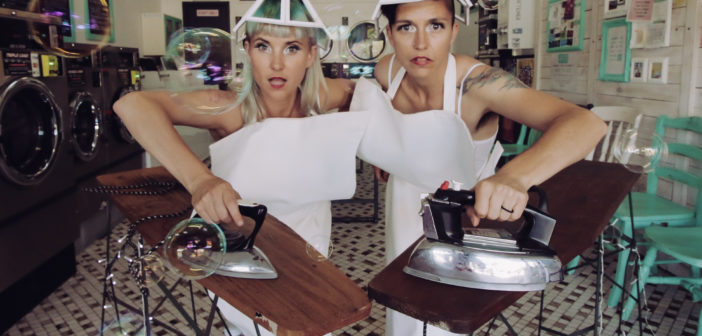The Ironing Maidens first came to our attention courtesy of Cyclic contributor Jason Richardson’s review of their show at the Little Red Laundrette in Griffith earlier this year. You can read his review here. A duo of Melania Jack and Patty Preece, they perform electronic music using laptops, microphones and MIDI-enabled irons, with songs referencing domestic duties, female empowerment and gender roles. Frequently touring regional laundromats throughout Australia, in his review of their Griffith show Jason suggested that their performance art orientated intersection of music and gender politics, “might seem like a shtick at first but it’s so thoughtfully executed in composition and performance that it makes most rock bands look naive.”
They’ve just released their new EP Electro House Wife and are about to embark on a Queensland tour, taking in laundromats from Cairns to Boyne Island (you can find the dates here). With such a unique approach to music making (and touring) we just wanted to know more. This is the music that moves them.
The Ironing Maidens.
In trying to narrow down some of our influences we have focussed on artists who have directly influenced our new EP – Electro House Wife. We also considered Madelene Bloom’s (ableton producer) concept that most of the music we hear is made by men, and we are used to listening to these kinds of structures and sounds. Because as humans we love repetition and the familiar, we keep on making those similar sounds even if we are not male. What would be a female sound? These female identified musicians push the boundaries of those musical constructs that we have come to rely on so heavily. They all share this sense of being ‘ahead of their time’ and their work has influenced ours.
Daphne Oram- Tumblewash
We have to start with Daphne Oram in particular because our show has been put together as a homage to her work. We had both been studying and playing electronic music for some time before we even discovered Daphne. We saw that she was listed as an influence on The Knife’s website and so started looking into her work, which sparked a conversation about why we had not heard of her. Daphne pushed the BBC to let her set up the now infamous BBC radiophonic workshop, she developed one of the first synthesizers, the Oramics Machine and she composed in her own studio, Tower Folley. Daphne composed countless electronic music pieces from the 1940’s on and wrote two books on electronic sound. Not well recognised for her work while she was alive, and having to endure a huge amount of sexism from the industry, she is finally getting her place in the EMP history books. What we love about her compositions is that they are so timeless. Pieces like Still Point (the first piece to include both orchestral musicians with recordings on disc in a live performance, which was never realised until 70 years later) and Four Aspects (which could have been written last year it’s so current in it sound) you can see why she had been heralded as the grandmother of techno. But a favourite of ours for it’s fun sound and underlying irony is Tumblewash, and it makes us laugh that we are still doing the same kind of tracks in our own show, clearly not a lot has changed since the 1950’s.
Delia Derbyshire – Way Out
Delia, a younger protege of Daphne’s at the BBC radiophonic workshop is also a favourite for her TV drama inspired pieces like Way Out (originally rejected by the BBC but eventually ending up on a deodorant commercial) with crazy 11/8 time signature and intriguing melodies. I remember once we were speaking at an industry event and were interrupted by a man in the audience who really wanted to let us know about the ‘man’ (Ron Grainer) who wrote the Doctor Who soundtrack. It’s moments like this that make us realise that it’s really important to keep saying the names of the women of electronic musical history – aloud. It might have been Ron who wrote the original score, but it was the unacknowledged Delia who took the tapes and cut, looped, repitched, reversed and effected them to make the soundtrack what it is remembered for; a stunning, groundbreaking composition that was way ahead of its time.
Peaches
Peaches threw the ‘nice girl’ concept out the window straight up. Listening to her first albums was like a breath of fresh air, chunky beats, addictive basslines, dirty grooves and filthy lyrics smashed something, broke the mould and gave female musicians permission to say something new.
Honey Dijon – The Best of Both Worlds
Honey Dijon’s recent album had influenced a few of our tracks on this EP, both for her house sounds and her attitude to music, the club scene and the house movement. We got to listen to her speak about the album at Loop Festival in Berlin last year and her passion for the movement of house music was infectious. This debut album brings all that together, we love the track Love muscle.
Bjork – Biophilia
Bjork has pushed the doors open in the world of music and technology for our generation. The Biophilia album really spoke to us about the link between sound and nature, technology and education. This track Mutual Core about the earth geology is a particular favourite.
Kaitlyn Aurelia Smith – The Kid
Kaitlyn’s lush textures and stunning compositions take the listener on such an aural journey. Her latest album that came out last year is just gorgeous. We had the pleasure of seeing Kaitlyn perform at Mona Festival a few years ago and just loved getting to hear this music on a massive system outside. It felt like we were on a new planet!
Piloka Krach – Who’s afraid of Justin Bieber
Having spent a lot of time in Berlin over the last 10 years, we can’t help but be influenced by artists like Piloka Krach. Dancefloor sounds, crazy concepts and a dash of humour. Piloka has so many fantastic tracks but this one always grabs attention on a playlist.
You can find out more about the Ironing Maidens here.




